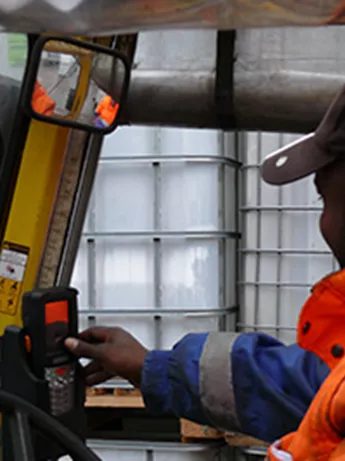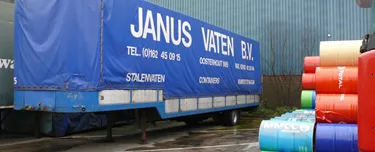"In less than a year we have already been able to invoice 50,000 euro of waste processing costs. iForks and UniMobile work so well, that we have significantly reduced our cost level."
- ROELAND JANUS, OPERATIONS MANAGER
How to charge customers for processing of residues
Janus Vaten collects IBC’s and steel drums at their customer’s site, for cleaning. After the cleaning process, the drums and containers are repaired if needed, then offered for re-use. Janus Vaten processes 5,000 drums and 200 to 300 IBC’s daily. The residues left in the IBC’s, vegetable oils, chemicals, paint and resins, are sucked out and stored for removal by a waste processing company. Until recently, Janus Vaten was not able to charge their respective clients for the residue processing costs.
Sustainable entrepreneurship with Unimobile and iForks
Now that environmental laws are becoming more strict and sustainable entrepreneurship more important, it is also more readily accepted that the producer of waste pays for its removal and destruction. In order to be able to invoice their customers for processing costs, Janus Vaten purchased a RAVAS legal for trade fork scale for one of their Hyster forklifts, and a handheld terminal for registering IBC weights.
All weights directly integrated
The weighing/invoicing procedure works as follows: a lorry with used IBC’s is offloaded at the Janus hub. The forklift driver lifts two stacked IBC’s from the lorry. The weight of the IBC’s is automatically transferred to the handheld terminal via UniMobile. The driver enters the name of the customer and a code for the IBC type, defining its own weight. He then pushes the "save"-button to register weight and ID’s on the terminal. He stores the containers and returns to the lorry to offload the next IBC’s. When the lorry is fully offloaded, he drops off the terminal at the office, where it’s connected to a PC via USB-cable. The computer downloads the data to an Excel-file, from where they can be used for invoicing.
Forklift driver Antonio: ‘It’s real easy to work with. One push of a button and you’re done.’

Satisfied with Unimobile: 'It's really easy to work with'
Roeland Janus: 'It took us some time to convince our clients of the need to weigh and invoice the residues in the IBC’s. But companies’ mind set is changing: IBC's are now more often returned empty.'

COMPANY
Janus Vaten
LOCATION
Oosterhout, The Netherlands
APPLICATION
Controlling waste flows
Controlling waste flows
Every production process generates rest materials and waste. These waste materials are either recycled into the production process or removed and destroyed. These procedures are often expensive, making reduction of waste flows an important issue. Monitoring waste flows, i.e. knowing how much waste is produced at each spot in the production line, is the first step towards controlling and minimizing waste flows. With a mobile scale on the pallet truck or forklift truck that removes the waste material, you can efficiently measure waste production anywhere in production, finding out which processes should be optimized.
